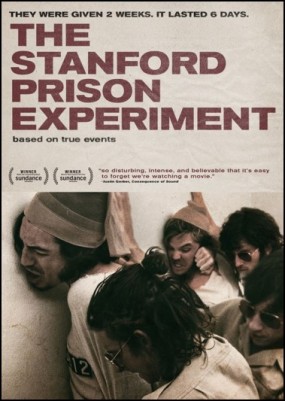Today’s review is a Video on Demand Pick
The Stanford Prison Experiment begins with a little background. We’re told that the psychology of imprisonment is being studied and we watch as a group of young men are interviewed during a screening process. It’s 1971 and Professor Billy Zimbardo's graduate-student staff are selecting their study participants. They’re also asking these young men if they would prefer to be prisoners or prison guards in the experiment. All of them choose to be prisoners, but a handful are put to work as guards.
At first, everything falls into place. The folks that have been chosen to participate will be paid 15 dollars per day. Everyone is assigned their part and things start evolving rapidly from there. We watch as these willing participants are arrested, some of them right in front of their homes. They’re taken into custody as if they’d actually committed a crime. It is quite clear from the beginning that Billy Zimbardo (Billy Crudup) is not messing around.
Most prisoners fall right into line, but not all. One of them can’t deal with authority like the others. Prisoner 8612 (Ezra Miller) is not the same. He's not alone because there’s a special prison guard, too. Christopher Archer (Michael Angarano) wanted to be a prisoner, just like the others, but he was chosen to be a guard. He also chooses to have a little fun with the part.
Archer decides he’s going to be an awfully mean guard. He wants to be the nasty son of a gun who will keep things interesting throughout the experiment. He does not fail in this respect and things quickly spiral out of control. His negativity swiftly infects his fellow prison guards and together they make the prisoner’s lives utter hell.
The Stanford Prison Experiment is a movie about what happens to people when they’re imprisoned. It details the breakdown, complacency, fear, camaraderie and violence that bubble to the surface when identities are crushed and new roles are thrust upon those with no rights. The authority appears intoxicating and the complacency maddening.
"Power tends to corrupt, and absolute power corrupts absolutely." We’ve all heard some variant of Lord Acton’s quote by now, right? Well, he was right and we all know it. We know that going in, yet that knowledge doesn’t make this film any less impactful. The thing about The Stanford Prison Experiment is that if you’re not in it for the shock value, you’re not going to get a whole lot from this trip. If you’re open to jarring, visceral reactions, then you’re in for one hell of a ride.
I’ve got to be completely honest with you fine people. I chose to watch this mostly for Ezra Miller’s performance and while it was indeed excellent, Michael Angarano stole the show. Angarano brings us a prison guard that is not only a leader, but also a masochist. His performance is fierce, disturbing and even flat out frightening in spots.
I expected Ezra Miller to be perfect because I’m a fan of his work. I wasn’t disappointed. As prisoner 8612, he represents the rebellious spirit we all like to think we’ve got buried deep within. At first, Miller brings us an incredulous experiment subject who refuses to accept the situation he himself signed up for. Unfortunately for him, Lord Acton’s quote is more true than any one of us want to admit. Swiftly and painfully his resistance is met with abuse of power. Prisoner 8612 starts the experiment as an arrogant know-it-all and we watch as he devolves into a trembling, disoriented and troubled boy. His performance is viciously good.
In reality, the entire cast makes the most of their parts. The acting is, across the board, well executed and gripping. The intensity of every scene translates precisely and it is felt sharply. Director Kyle Patrick Alvarez knows how to keep the tension high while simultaneously focusing on story development. There are however a couple of scenes where he seems to lean too heavily on the shock value to keep things interesting. That final scene of abuse, which leads to the end of the experiment, is a prime example of what I’m talking about. It goes on too long and doesn’t give much back outside of the aforementioned shock. The great thing about this movie is that you feel like you’re watching these events unfold alongside Dr. Zimbardo and his staff. Alvarez fully immerses us in this study and utilizes the most atrocious aspects of the human condition to make us feel just as trapped as any one of those prisoners.
It’s true. The Stanford Prison Experiment is a bit much, but the overwhelming nature of the filmmaking here does more good than harm. If you can appreciate aggressive storytelling and are comfortable confronting the drawbacks of human nature, you’ll enjoy this film.
The Stanford Prison Experiment (2015) – B-
B- =This is a pretty good time and you should give it a whirl. You never know, you might enjoy it more than you think going in. It has its pitfalls, but overall worth your time.




